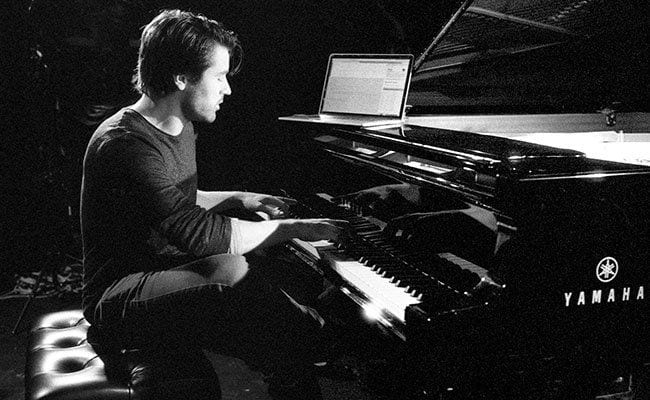
My relative ignorance of pianist Dan Tepfer is hereby admitted to, shamefully confessed, and hopefully atoned for. His background is complex but formidable: raised in France of American parents; educated in classical music early, in astrophysics as an undergrad at the University of Edinburgh, in jazz (with Danilo Perez) at the New England Conservatory, and in music by being the pianist with Lee Konitz and playing with Steve Lacy, Paul Motian, Joe Lovano, Mark Turner, and many others.
Clearly, I’ve been keeping a closed eye to Tepfer, but no more.
Eleven Cages is a piano trio record with Thomas Morgan on bass and drummer Nate Wood. For folks like me who’ve been snoozing on this talent, this is a door flung open. The music here is an appealing and compelling variant on the New Jazz — complex but tonal, dealing with the rhythms of the last 30 years (hip-hop, but also hypnotic patterns from electronic music), but also swinging in various ways, open in form and arrangement so that you simply don’t expect “melody-solos-melody” anymore. There is one standard in “I Loves You Porgy”, but it is not played outside the tradition — just once through with a searching outro that explores a single chord.
Perhaps more obligatory is Bad Plus-ified pop tune, in this case, Beyonce’s “Single Lades” given a New Orleans parade groove and a harmonic treatment that trades in Monkish close dissonances and more open harmonies that sound almost like Stephen Sondheim got his hands on the song. The contrast between these two kinds of sections of the performance is what makes it delicious — that and the drum feature set up toward the end, with Tepfer and Morgan creating a throbbing underpinning that lets Wood rave it up more and more and more until it just ends without the return of the melody. Nice.
At the other end of the spectrum, Tepfer creates some tunes that feel more like environments for improvising than like normal melodies. “Little Princess” creates a hurry up-slow down feeling that is extremely free, allowing the players to cruise over the waves of the song, then shifts into a written portion that dramatically accelerates the tempo before heading back to the push/pull section. And that’s it — a quick idea and not much more.
The two “Cage Free” takes are even freer — what sounds like an entirely improvised trio and then a free duo for Tepfer and Morgan, though certainly telepathic ones. “Hindi Hex” is for solo piano, and it also sounds improvised from scratch, though it is a meticulous, tonal kind of freedom. Tepfer’s aesthetic is quite precise, and his repetitions of patterns and motifs aren’t swirling like Cecil Taylor, not whimsical like Corea, not gospel driven like Jarrett. He is working an area that sounds like an even balance between classical recital and the avant-garde.
The core of the trio comes out in performances like “Roadrunner”. with Wood and Morgan setting up a machine-like groove that is still rubbery enough to launch your feet and ass. The song itself avails itself of some blues but also lifts up on shining jazz progressions. It feels like a new century anthem. “Converge” is similar, built around a lurching bass line for Morgan and Tepfer’s left hand in unison, then shifting into a minor ballad before weaving the ideas together for a piano solo that goes from hopping to a blues kind of swing and back again.
The band also works ballads very nicely. “Minor Fall” begins as one of most direct tunes on Eleven Cage, the solo piano introduction managing to sound slightly Guaraldian. It is one of the loveliest ballads I’ve heard in years — brief and affecting. Morgan takes a quick turn at the melody before Tepfer reimagines the melody as a dirge, but a beautiful one. “547” is more varied. What begins as a throbbing ballad develops a double-time feeling on Wood’s cymbals, and then the band can choose to shift into a second gear as it sees fit.
To my ear, this is a trio still writing an early chapter in its book. There are certain places where the music sounds so fresh that I find myself catching my breath listening to it. “547” spins and raises the stakes… and then it ends with Tepfer alone, playing chiming variations on the theme. It seems like the least obvious and most wonderful way to end things. At other times I sense that the band is still feeling its way toward a clear, consistent concept. For example, when “Cage Free I” finds its way into a groove that hints at “A Love Supreme”, I want to hear the band push harder into something earthy and bold. But the tunes ends up being more of a miniature.
Still, this is usually thrilling music, fresh, largely cliche-free and always smart. Tepfer is not that young (35), not a new face (except to foolish me), but I believe he’s onto something great. I’m eager for more, and I can already recommend his duet recording with saxophonist Ben, Small Constructions, which adds electric piano to the mix and which mashes genres, standards and originals, spontaneity and technical precision. Dan Tepfer has stories to tell. Tuck yourself in and listen.


![Call for Papers: All Things Reconsidered [MUSIC] May-August 2024](https://www.popmatters.com/wp-content/uploads/2024/04/all-things-reconsidered-call-music-may-2024-720x380.jpg)



